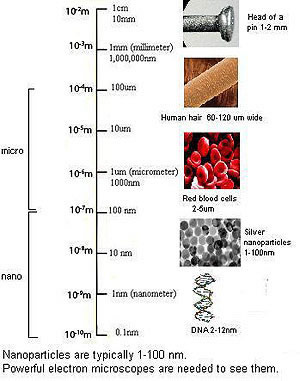Nanosilver

What is nanosilver?
Silver is a well known metal used by humans for centuries. Recent advances in nanosciene (the science and manipulation of chemical and biological materials with dimensions in the range from 1-100 nanometers) led to the development of silver nanoparticle. A silver nanoparticle consists of many silver atoms or ions clustered together to form a particle 1-100nm in size. Due to their small size, these nanoparticles are able to invade bacteria and other microorganisms and kill them.
Silver nanoparticles (or nanosilver) are now widely impregnated into a wide range of consumer products, including textiles such as socks, sportswear, underwear and bedding, vacuums, washing machines, toys, sunscreens, and a host of others. A listing of over 250+ products is below.
However, the long term impacts of this new technology to human health and the environment are still unknown. Recent studies have found impregnated textiles, when laundered, release silver nanoparticles into the wash cycle and eventually into wastewater systems and the environment. In the environment, these nanoparticles become dangerous to microbes essential for ecologic systems. There have been some reports demonstrating that nanoparticles can cross the blood-brain barrier to enter the brain.
Nanotechnology has many useful and promising applications that can benefit mankind, but nanotechnologies are still new and even though they are having commercial success in the market place, there are big unanswered questions about their potentially harmful effects on our health and the environment.
Resources
- Nanotechnology's Invisible Threat: Small Science, Big Consequences
- Product Inventory (complied by International Center for Technology Assessment (ICTA)








